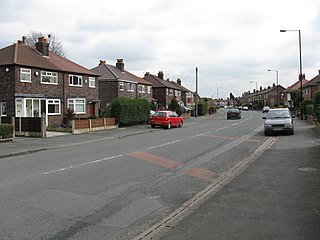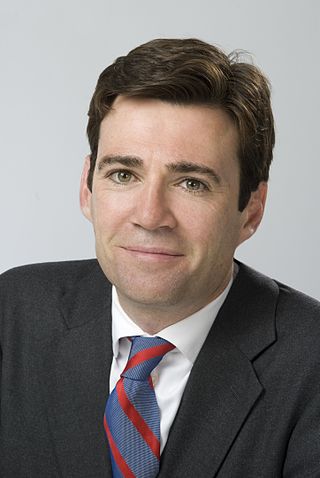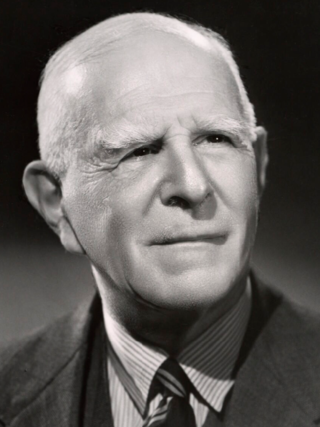
Trafford is a metropolitan borough of Greater Manchester, England, with an estimated population of 236,301 in 2022. It covers 106 square kilometres (41 sq mi) and includes the area of Old Trafford and the towns of Altrincham, Stretford, Urmston, Partington and Sale. The borough was formed in 1974 as a merger of six former districts and part of a seventh. The River Mersey flows through the borough, separating North Trafford from South Trafford, and the historic counties of Lancashire and Cheshire. Trafford is the seventh-most populous district in Greater Manchester.

Sale is a town in Trafford, Greater Manchester, England, in the historic county of Cheshire on the south bank of the River Mersey, two miles south of Stretford, three miles northeast of Altrincham, and five miles southwest of Manchester. In 2021, it had a population of 54,515.

Altrincham and Sale West is a constituency represented in the House of Commons of the UK Parliament since the 2024 general election by Connor Rand of the Labour Party.

Wythenshawe and Sale East is a parliamentary constituency in the city of Manchester and the borough of Trafford. It returns one Member of Parliament (MP) to the House of Commons of the Parliament of the United Kingdom, elected by the first past the post system.

Bowdon is a suburb of Altrincham and electoral ward in the Metropolitan Borough of Trafford, Greater Manchester, England.

Salford was, from 1844 to 1974, a local government district in the county of Lancashire in the northwest of England, covering the city of Salford. It was granted city status in 1926.

Sale was, from 1867 to 1974, a district in Cheshire, England. The district had in turn the status of local government district, urban district and municipal borough. Its area now forms part of the Metropolitan Borough of Trafford, Greater Manchester.

Broadheath is a town in Altrincham, Greater Manchester, England. Historically part of Cheshire, it had a population at the 2011 census of 12,538.

Trafford Council, or Trafford Metropolitan Borough Council, is the local authority of the Metropolitan Borough of Trafford in Greater Manchester, England. It is a metropolitan borough council and provides the majority of local government services in the borough. The council has been a member of the Greater Manchester Combined Authority since 2011.

Elections to Manchester City Council were held on Thursday, 1 November 1945. One third of the councillors seats were up for election, with each successful candidate to serve a three-year term of office. The council remained under no overall control. These were the first local elections held in Manchester since the outbreak of the Second World War.
Altrincham and Sale was a parliamentary constituency in Greater Manchester, represented in the House of Commons of the Parliament of the United Kingdom. It elected one Member of Parliament (MP) by the first past the post system of election, and existed between 1945 and 1997.
Elections to Manchester Council were held on Thursday, 2 May 2002. One third of the council - alongside a vacancy in Moss Side - was up for election, with each successful candidate to serve a two-year term of office, expiring in 2004, due to the boundary changes and 'all-out' elections due to take place in that year. The Independent Labour candidates stood as "Independent Progressive Labour". Overall turnout rose to 24.4% and the Labour Party retained overall control of the Council.
The 1943 Woolwich West by-election was held on 10 November 1943. The byelection was held due to the death of the incumbent Conservative MP, Kingsley Wood.

On 13 February 2014, a by-election was held for the UK parliamentary constituency of Wythenshawe and Sale East, following the death of the former MP, Paul Goggins.

The inaugural Greater Manchester mayoral election was held on 4 May 2017 to elect the Mayor of Greater Manchester. The next successive election was due to be held on 7 May 2020, but due to that year's outbreak of the novel Coronavirus, the election was postponed until May 2021. Subsequent elections are legislatively required to be held every four years thereafter. The electoral system used for the election is the supplementary vote (SV).

The 2021 Greater Manchester mayoral election was held on 6 May 2021 to elect the mayor of Greater Manchester. This election, alongside other local and mayoral elections across England and Wales, was originally scheduled to take place on 7 May 2020, but was delayed by the UK Government on 13 March 2020, due to the unfolding COVID-19 pandemic. The election took place on the same day as council elections within the city-region, including the election for the mayor of Salford, as well as elections across England and Wales. It was the second election to the position of mayor. It used the supplementary vote as its electoral system.

An election to the County Council of London took place on 7 March 1946. The council was elected by First Past the Post with each elector having two votes in the two-member seats. The Labour Party once more made gains, again increasing their majority over the Conservative Party.

Elections to Manchester City Council were held on 6 May 2021, as part of the 2021 United Kingdom local elections. They were originally scheduled for 2020 but were suspended for a year, due to the COVID-19 pandemic. In 2019 Labour had retained its majority on the council, with 93 seats, with the Liberal Democrats led by former MP John Leech increasing the number of opposition councillors to three, but this had fallen back to two in March 2021 when Councillor Greg Stanton defected to the Labour Party.

Beginning shortly after the city's incorporation as a city in 1846, elections have been held in the mayor of Manchester, New Hampshire. The following article provides information on the elections for mayor in the city during the 20th century.















